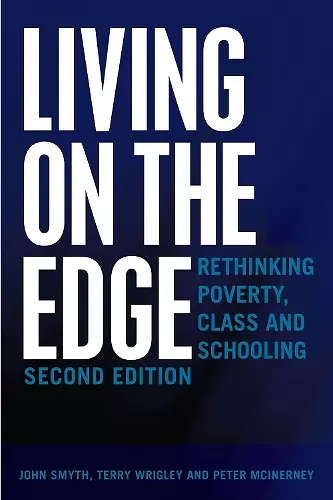Living on the Edge
Rethinking Poverty, Class and Schooling, Second Edition
Peter McInerney author John Smyth author Terry Wrigley author Joseph L DeVitis editor Linda Irwin-DeVitis editor
Format:Paperback
Publisher:Peter Lang Publishing Inc
Published:19th Feb '18
Currently unavailable, and unfortunately no date known when it will be back
This paperback is available in another edition too:
- Paperback£26.00(9781433116858)

Living on the Edge: Rethinking Poverty, Class and Schooling, Second Edition confronts one of the most enduring and controversial issues in education—the nexus between poverty and underachievement. This topic stubbornly remains a key contemporary battleground in the struggle to raise standards. Living on the Edge maps and compares a number of competing explanations, critiques inadequate and deficit accounts and offers a more convincing and useful theory. The authors challenge the view that problems can be fixed by discrete initiatives, which in many instances are deeply rooted in deficit views of youth, families and communities. The book systematically interrogates a range of explanations based outside as well as inside schools. It draws upon positive examples of schools which are succeeding in engaging marginalized young people, providing worthwhile forms of learning and improving young lives. This second edition contains two expansive case studies that exemplify, explain and illustrate the themes coursing through the book. Living on the Edge's second edition remains a "must read" for anyone concerned about or implicated in the struggle for more socially just forms of education.
“Living on the Edge tackles tough issues about class, poverty and justice that are of central importance for teachers, parents, policy-makers—and young people. The book combines clear writing, good scholarship, and firm commitment. Clearing a path through the forest of misleading ideas about educational disadvantage, Smyth and Wrigley show the educational damage done by current market-driven policies and testing systems. Bringing together the experience of creative teachers and schools that work well in tough circumstances, they show how schools can make positive and immediate gains for fairness and good education.”—Raewyn Connell, University Chair, Faculty of Education and Social Work, University of Sydney
“Smyth and Wrigley’s book is an uncompromising exploration of the factors that contribute to the continuing marginalisation by schools of children [of disadvantage]… This book would have transformed my thinking and practices [as a beginning teacher]. It will do the same for any educator and policy-maker intent on achieving more socially just schooling.”—Jane Pearce, Journal of Educational Administration and History
“One of the strengths of the book is the care and detail with which arguments are built, thereby silencing possible criticism of bias due to the (frankly stated) adherence by the authors to critical sociological traditions.”—Kitty te Riele, Social Alternatives
“This book is an essential reading for anyone requiring a sophisticated understanding for how education and class interrelate in ways that reinforce and reproduce social stratification and inequality.”—Carlo Raffo, Journal of Education Policy
“This timely book should be a wake-up call for the commentariat, policy makers, as well as, educators and researchers that so-called bootstrapping has always been an individual solution to what is in reality a class-related and community-wide problem… Those who read this book will be better equipped whether they are teachers, policy makers or politicians to create schools of hope for children of promise.”—David Zyngier, International Studies in Sociology of Education
“Smyth and Wrigley do a fantastic job of slowly scaffolding their argument around the concept of what class and poverty really are (and what they are not) and how students, families, communities, teachers, and schools are impacted by those things… I found myself exclaiming ‘Yes!’ and ‘Of course!’…throughout the book…. I commend the authors for their comprehensive look at class and poverty and how they impact schooling.”—Scott Farver, Education Review
“This is an inspirational and timely book…surprisingly few books on social justice and education tackle the topic of poverty, and even fewer tackle it as comprehensively and coherently as Living on the Edge.… This is a book of hope.”—Hanneke Jones, Improving Schools
“Living on the Edge…is a highly readable and productively usable book. It is also a timely, necessary and unblinking account of neoliberalism’s power in flagrante delicto as it diminishes education to a bruising ‘bottom line’. As Stephen Ball urges [in his endorsement], it is a book that ‘cannot and must not be ignored’.”—N. Geoffrey Bright, Power and Education
“Smyth and Wrigley offer a lively and important intervention into current debates about the importance of class that challenges the real-and-imagined totality of capitalist schooling. It is sure to ruffle cherished beliefs about teaching and learning…readers will find this book to be both provocative and engaging.”—Gregory Martin, Discourse: Studies in the Cultural Politics of Education
“Living on the Edge should be compulsory reading for all policy-makers and educators in the developed world (the minority world), and then perhaps decisions about where funding should be allocated would be more easily solved.”—Kathryn Paige, British Journal of Educational Studies
“Living on the Edge critiques [the] straight-jacket testing agenda that is crippling quality education and exacerbating the problems of poverty… It asserts that quality teaching and learning is a social justice issue.”—Janine Kitson, New South Wales Teachers Federation
“There is no doubt that Living on the Edge is an example of leading critical scholarship… There is much to commend in this new book, but perhaps my highest praise is that I will be recommending it to my policy-making colleagues.”—Brenton Prosser, Critical Studies in Education
“Living on the Edge is a profoundly important book, and given that the policies of the present UK government are likely to make the situation worse, a timely one for British readers. I hope it will be widely read.”—Derek Gillard, Forum
ISBN: 9781433135101
Dimensions: unknown
Weight: 465g
310 pages
2nd Revised edition